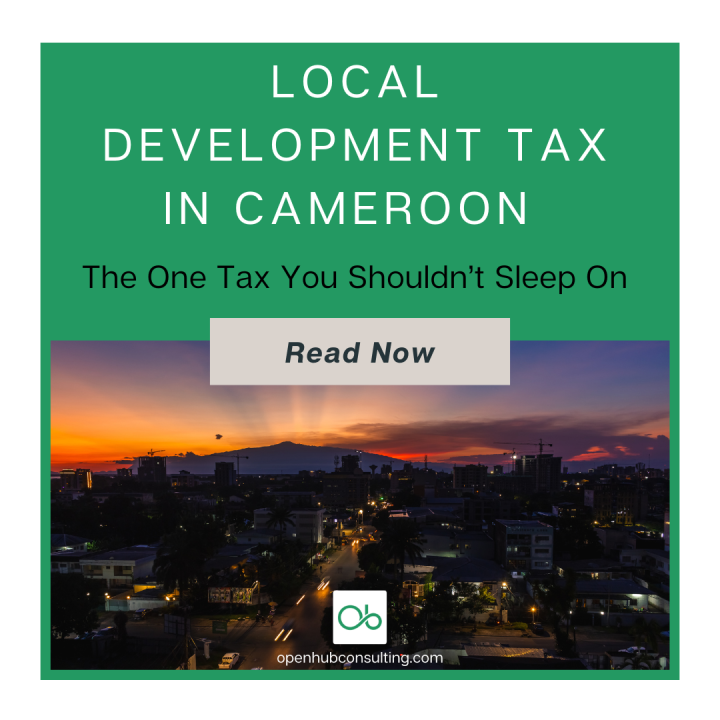
The Concept of Company Tax as Government Ownership
October 9, 2024
Client Feedback Form
May 27, 2025There is this little tax in Cameroon that rarely makes headlines, but you can find it in your payslip. Both workers in the public and private sector pay this tax. It is called the Local Development Tax, LDT (Communal Tax).
Many are unaware of how this tax works. If you’re running payroll in Cameroon, I will help you understand how it works.
What exactly is the local development tax?
This tax is a municipal tax collected by employers on behalf of the local councils. Yes, employees are the ones taxed, but employers are those liable to pay the tax, hence they withhold it at source when paying salaries.
Why? To cover the cost of public services that the councils provide – like lighting, garbage collection, sanitation, ambulance services, water and electricity in some localities. In other words, the tax helps to keep our cities and towns running.
Who pays the local development tax?
Employees of both the public and private sector, as long as you are earning a monthly salary.
How is it calculated?
LDT is determined by applying a monthly basic salary to the income brackets below. This will determine the fixed annual LDT amount which is then divided by 12 and applied on employees monthly salary.
The payroll manager or tax authority uses the your basic monthly salary (not gross salary) to determine your bracket. The bracket tells you exactly what you owe per year. This annual amount is then split over 12 months and paid monthly on or before the 15th of the month for the previous month.
Local Development Tax (LDT) Brackets – 2024
| Monthly Basic Salary Range (FCFA) | Annual LDT Amount (FCFA) | Monthly LDT Deduction (FCFA) |
|---|---|---|
| 0 – 62,000 | 0 | 0 |
| 62,001 – 75,000 | 3,000 | 250 |
| 75,001 – 100,000 | 6,000 | 500 |
| 100,001 – 125,000 | 9,000 | 750 |
| 125,001 – 150,000 | 12,000 | 1,000 |
| 150,001 – 200,000 | 15,000 | 1,250 |
| 200,001 – 250,000 | 18,000 | 1,500 |
| 250,001 – 300,000 | 24,000 | 2,000 |
| 300,001 – 500,000 | 27,000 | 2,250 |
| Above 500,000 | 30,000 | 2,500 |
Why should you care?
Ignoring the LTD is risky for businesses. If you miss a declaration, under-declare or stay non-compliant, your business will get fined. This may lead to tax audits and the freezing of your tax clearance certificate (certicat de comfromite fiscale).
This tax may look small, but supports some of the biggest needs in communities. If you are an employer, don’t wait for the authorities to come knocking before you pay. Declare, pay and file it even if you owe zero tax.
If you are not sure how to go about it, we can help you. We offer payroll management services in Cameroon. We work with businesses across different sectors in Cameroon to keep their payroll clean, compliant and stress-free.
Do you need help with your payroll?
At OpenHub Consulting, we
- Automate LDT, IRPP, and CNPS calculations based on official tax tables
- Help you file monthly payroll declarations on time
- Make sure your salary structure aligns with compliant tax practices
- Ensure you team is audit-ready with no last minute surprises.
Visit OpenHub Digital for more on how to start, run and grow your business in Cameroon



2 Comments
Greetings sir.
I have a little worry on how taxes of small, medium and large businesses are declared.
A mass of the population especially those who own small and medium size businesses can’t really calculate exactly what they are to pay as taxes.
In this light for example my provision store’s capital is 1,000,000FCFA, Monthly rent is 20,000.
How can I determine my turn over?
Whick taxes must I pay quarterly and yearly?
Thanks
Hello, good day!
Thanks for your question. Here’s a simple explanation:
Turnover is the total amount you make from sales before subtracting any expenses. For example, if you sell goods worth 10,000 FCFA daily, your monthly turnover is about 300,000 FCFA.
For your provision store with 1,000,000 FCFA capital and 20,000 FCFA rent, under the Comprehensive Tax System, you’ll pay tax based on your annual turnover, not your profit or capital.
Here’s how it works:
If your annual turnover is between 500,000 – 1,000,000 FCFA, your annual tax is 30,000 FCFA, paid quarterly as 7,500 FCFA.
This tax covers income tax and local taxes. There is no separate business license tax anymore.
Let me know if you need help calculating your turnover or with your tax declarations.